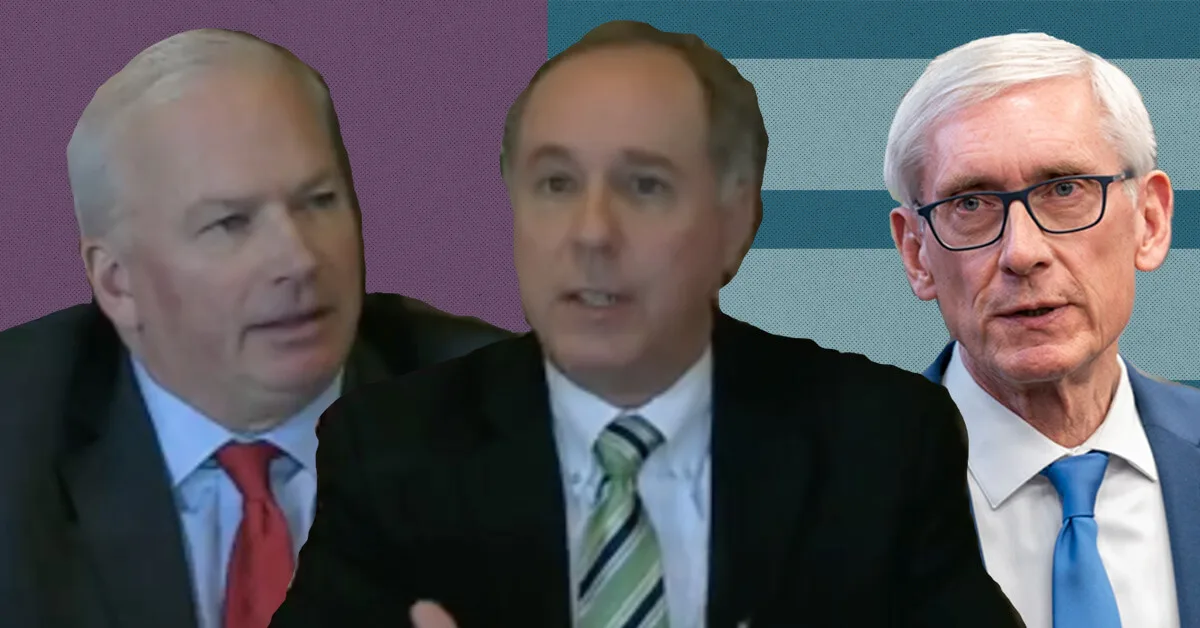
#image_title
#image_title
Federal, state and rainy day funds needed to help with health care and unemployment
Hours after the state’s top two Republican leaders said they were working on legislation to address the COVID-19 outbreak in Wisconsin, Gov. Tony Evers introduced his own $541 million package to combat the virus.
Evers’ package is the second he has given to lawmakers since last Monday. The previous 65-page bill has a $700 million price tag, bringing the total dollar amount the governor believes is required to carry the state through the pandemic to $1.3 billion.
In a letter to the top two Democratic and Republican lawmakers of each caucus, Evers wrote, “as you know, time is of the essence and it is critical that the Legislature take up comprehensive legislation to provide needed relief as soon as possible.”
A big ticket item in Evers’ bill would increase funding to Medicaid providers, meaning hospitals, home care providers and hospice care providers, to name a few, by $94 million. The money is needed to cover staff overtime costs associated with the COVID-19 outbreak.
The bill would also provide grant funding for small businesses and workers through the Wisconsin Economic Development Corp., provide COVID-19 reinsurance program to reduce health insurance premiums, waiving interest and penalties on delinquent property taxes and providing supplemental payments to child care providers who have had to shutter their doors to the public health emergency.
Wisconsin learned late last week the state would receive $1.9 million due to the passage of the $2.2 trillion federal Coronavirus Aid, Relief and Economic Security, or CARES, ACT. While the state knows how much it will receive, Senate Majority Leader Scott Fitzgerald, R-Juneau, and Assembly Speaker Robin Vos, R-Rochester, said they did not want to pass legislation on the state level until they knew what was coming from the federal government.
While Evers welcomes the federal funds, he believes the Legislature can act now.
“Whie the federal government’s response is welcome and necessary, there are many items that require the state legislature to act, including suspension of specific statutory provisions and providing state funding to fill gaps in federal response,” said Evers in the memo to legislative leaders, including Fitzgerald, Vos, and Senate Minority Leader Jennifer Shilling, D-La Crosse, and Assembly Minority Leader Gordon Hintz, D-Oshkosh.
In the joint call with reporters Wednesday, Fitzgerald and Vos said they are now waiting on the nonpartisan Legislative Fiscal Bureau to provide an analysis of the federal bill before finalizing their own proposal, separate from the governor’s.
“Certainly we want to know what is in the federal bill before we spend precious state resources,” Vos said. “I do want to commend the minority for working with us. Our hope is to get a bill that everyone will vote for that doesn’t raise serious objections and the goal would be to have that as soon as we can.”
Vos added, “we do not want to have an artificial timeline on it because we want to get it right but we do appreciate speed is off the essence.”
Both lawmakers said there is “broad support” for passing Evers’ recommendation to waive the one-week waiting period to qualify for unemployment insurance benefits, at least until the economy returns to normal and the pandemic has run its course.
“For anyone that is unemployed and concerned about whether they can still pay their rent, pay the mortgage, we want to make sure they have access to those benefits,” Vos said. “I’m pretty confident that by the time we adjourn the session that is an example of something that will become law.”
In the bill Evers introduced Wednesday, anyone who filed for unemployment since the public health emergency was declared on March 12 would automatically receive a check to make up for the week they had to wait.
The one-week waiting period was approved while Evers’ Republican predecessor, Scott Walker, was governor. The budget Evers proposed last year called for its removal but the Republican-controlled Legislature did not approve the idea at that time.
Vos said when the bill legislative leaders are preparing is ready to be voted on the Legislature will meet in an extraordinary session. This is an expedited process under which the Legislature can meet. It does not, however, allow for public hearings to be held.
This fact prompted Vos and Fitzgerald to acknowledge they have been working with their Democratic counterparts to make sure there is agreement that the bill they create will pass and make it to Evers’ desk to sign.
“That’s why our goal would be to have one (bill) that is negotiated, explain it to the public so there is nothing that is not transparent,” Vos said.
Even with the federal and state money being considered to address the financial and healthcare-related costs associated with COVID-19, Vos said the state will have to use roughly $600 million in its rainy day fund.
“The rainy day fund would be our last effort to try to balance everything but certainly we will have to tap into that,” Vos said. “I can’t imagine we wouldn’t.”
Politics

‘I nearly died’: These women brought a grim warning to Wisconsin about abortion care restrictions
Traveling the country, they tell the real life-or-death situations that they faced because of extreme bans after the repeal of Roe v. Wade. For...

Opinion: It’s time for Congress to fight for small businesses instead of big corporations
May is National Small Business Month. Our elected leaders need to show leadership all year long. For the past 27 years I’ve been fortunate to pursue...
Local News

Four places it’s 100% okay to tip $0 in Wisconsin
Most people plan to tip at the usual suspects – restaurants, salons, ride-shares – but nowadays, it feels like customers are being prompted to tip...

Sip, sit, stay: 7 dog-friendly businesses in Eau Claire
When the sun’s out, everyone wants to be outside drinking and dining — including dogs! But not all establishments allow four-legged, furry visitors....



